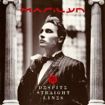
Marilyn: Despite Straights Lines:
The Very Best of Marilyn (Cherry Red)
Fame spreads like a virus. Just as Boy George was popping eyes and turning heads with Culture Club, the record companies and their minions were eager to sign any of his squat-dwelling partners in gender crime. Marilyn was Blanche to the Boy's Baby Jane. His iconic appearance in the Eurythmics' "Who's That Girl?" video proved an alluring one. This was a pretty boy who looked like a dead screen siren, who amped the whole arena of gender expectations.
Marilyn was the Candy Darling of the Blitz crew. Where make-up merely hid the plain truth lurking beneath the facades that were Steve Strange and Boy George, Marilyn had beauty on his side. A provocative siren who fooled many into believing they'd pulled a girl until it was too late, Marilyn was a thorn in the side of convention. Suddenly a select aspect of club-life was confounding the tabloid notions of the British public. A maverick genie was getting famous and threatening the very fabric of convention.
Signed after a heated flurry of interest, things had initially seemed certain to succeed. His debut single, "Calling Your Name," had done brisk business, a smash across Europe and #1 in Japan. It seemed that this gender-bending entity would have a lasting career, but Marilyn being Marilyn didn't help. His next single, "Cry and Be Free," hit the charts at #31, but his coy appearance in a black monastic robe was just a little too much for the Top of the Pops audience, and the record slid down the listings. Boy George, with whom Marilyn endured an at times explosive friendship, referred to it as "Try and Be Me." It is one of those quirks of unfair fate that "You Don't Love Me," the follow-up, a delicious catchy piece of pure pop, failed to chart.
A pretty face with decent material was unraveling, a financial liability. Marilyn was shipped to the States to work with Don Was, but the resulting single, "Baby You Left Me in the Cold," was his last U.K. chart entry, peaking at #70. By the time Despite Straight Lines hit the racks in 1985, Mercury Records were at a loss about how to proceed with the nose-diving of Marilyn's career.
Personal problems quickly engulfed Marilyn as his career floundered. Drugs took their toll, and the attempts to leave the dead screen legend persona behind backfired. People knew the Marilyn they wanted, and it wasn't the pinstripe-suited man on the cover of the album. The hanging out days with Diana Ross and Andy Warhol evaporated, and for years he was excavated by those who wished to question him about the '80s, Boy George, or both. Then the musical Taboo brought his youthful excesses into a fresher limelight.
The Marilyn who stepped forward was a saddening sight, vulnerable and broken, his looks a memorable distance from the reality he now inhabited. Agoraphobic, suffering from years of heroin excess, and the ravages of mental illness, he cast a haunting and haunted presence. Now the reissue of his sole album, with copious bonus tracks, displays a consummate talent who could write a memorable melody. The deviant diva deserves greater recognition for his obvious abilities, and this album is a real pleasure, sublime blue-eyed soul at its best. A postcard intimating what might have followed, had he managed the ravages of immediate success a little better. If pop is about that brief transcendent moment, then Marilyn was the ultimate pop visitation. Contentious, fabulous, and intoxicating, it really couldn't last. That it happened, albeit briefly, is enough.
Marilyn, now in his forties, lives quietly with his mother in North London.
